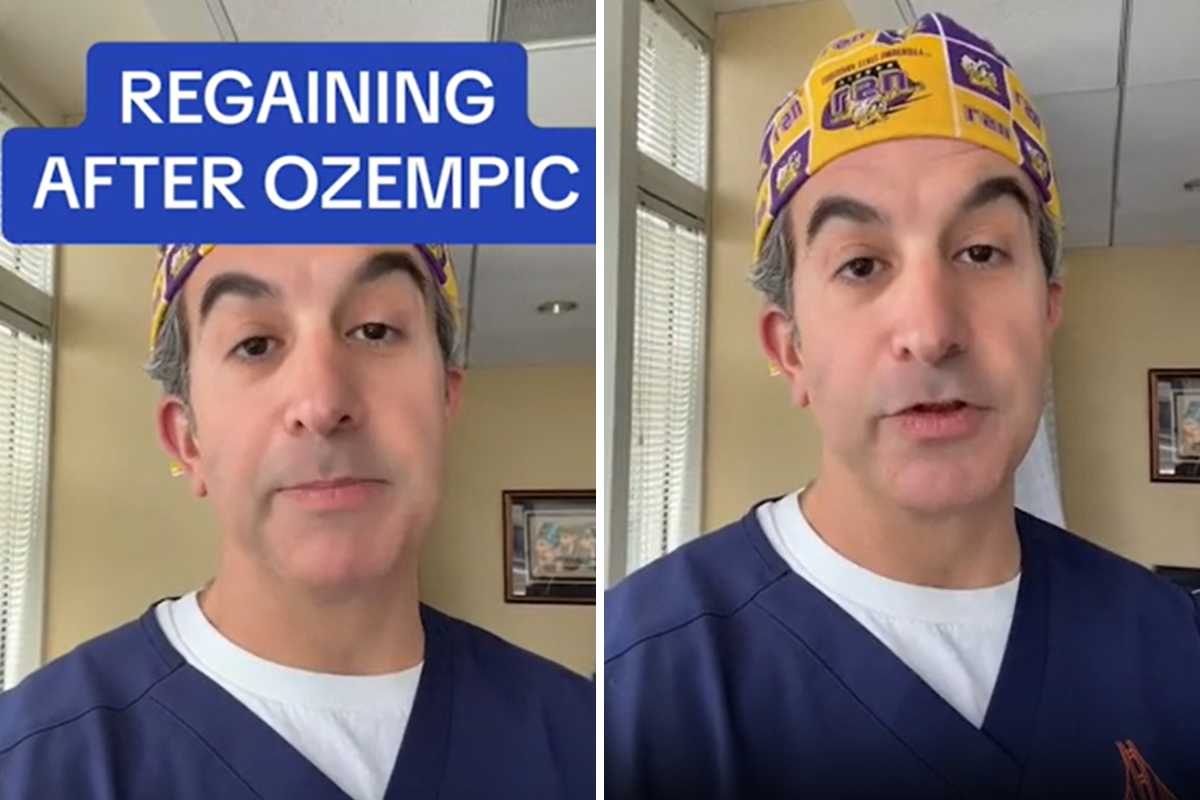A plastic surgeon has gone viral on TikTok for sharing a sobering truth about the weight-loss drug Ozempic.
Dr. Jonathan Kaplan, a board-certified plastic surgeon from San Francisco, has amassed 1.6 million views on TikTok (@realdrbae) with his warning: "Once you stop Ozempic, you will regain the weight."
Kaplan highlights that patients often cease using Ozempic, initially prescribed for blood sugar management, after reaching their weight goals—only to regain weight even when maintaining a diet and exercise routine.
Kaplan explained to Newsweek: "These medications lower the body set weight, or 'weight thermostat,' so you feel full sooner. Without the medications, that body set weight increases again."

In his video, Kaplan references a 2022 study examining semaglutide—the active ingredient in Ozempic—and its effects after 68 weeks in adults with obesity or related health conditions.
Study participants lost, on average, 17 percent of their body weight while using semaglutide with lifestyle changes. However, upon stopping the medication, they regained approximately two-thirds of the lost weight within a year, resulting in an overall 5.6 percent weight reduction from their starting weight. This rebound illustrates the persistent challenge of sustaining weight loss without continued treatment, suggesting long-term medication use may be essential to maintaining results.
However, not all TikTok users who commented on the clip agree.
"Been 6 months...still haven't gained a lb. It was a miracle medicine," said one user and another agreed, "Nope. Been off 18 months and Not. A. Pound. Gained."
But this doesn't ring true for all, one user said: "This is very true was on Ozempic reached my goal weight then stopped and regained it all back. Just started again."
"Lost 52 pounds on Ozempic in 5 months.Was taken off gained 85 pounds in 6 months. [Back] on Ozempic and dwn 7 pounds in 3 days. I'll just stay on it..." said another user.
Approximately one in three adults in America is overweight, and nearly two in five are obese. According to a Pew Research Center survey, many Americans don't believe that willpower alone suffices for weight loss maintenance. About 65 percent of respondents said that willpower alone typically isn't enough to lose and keep off weight. Still, Ozempic is not a go-to option for most, with only 3 percent of the 15.5 million people using the injectable diabetes drug specifically for weight loss, per a Gallup poll.
Earlier this year, Pew Research found that of 10,133 U.S. adults, only 16 percent who are familiar with these drugs believe they will significantly reduce obesity, while 35 percent think they will have a moderate effect, and 33 percent expect minimal to no impact on obesity in the U.S.
Diet and Exercise May Not Prevent Weight Regain
Kaplan emphasized that diet and exercise may not achieve goal weights alone but are essential for reducing lean body mass loss, along with benefits like reduced food cravings and improved mental well-being.
Regarding weight regain, Kaplan remarked: "Even with diet and exercise, studies show some weight return but not necessarily all lost weight, and certainly not the doubling of weight that some social media influencers claim. Biological factors are largely responsible for this." He also mentioned that reducing injections per month could help patients maintain their weight without further loss.
When asked if there are effective supplements or dietary changes to prevent weight regain post-Ozempic, Kaplan shared that no natural supplements like berberine or green tea are as effective. He added that GLP-1s like tirzepatide (found in Mounjaro and Zepbound) offer slightly more weight loss with fewer side effects than semaglutide, likely because tirzepatide mimics both GLP-1 and GIP, gut hormones released after eating.
Ozempic Is 'Not a Magic Solution'

Ruth Micallef, an eating disorder specialist based in Edinburgh, Scotland, has backed Kaplan's comments.
She told Newsweek: "Our studies consistently show us that roughly six to 12 months after coming off the drug, almost all of the participants gain the weight back. This is very much in line with the fact that Semaglutide is simply a medication, not a magic solution. It's role is simply to reduce appetite.
So when people inevitably have to come off of the medication again, their appetite returns to what it was before.
"The problem with these medications is not only that they are market as a "magic solution", but they also make the assumption that weight gain occurs due to "personal defect"; due to "laziness", "greed", or a "lack of motivation". When in fact, the reality is very different. In Eating Disorders, binge eating is not only one of the most common symptoms, but also one of the most stigmatised and underdiagnosed."
Micallef describes binge eating as "a coping mechanism" and explained that people often do it wheen trying to "detatch" from unwelcome thoughts and emotions.
She added: "What I see the marketing of these drugs doing is that it minimises and dismisses the root of weight gain, and instead focuses on simply appetite reduction.
"The reality is, binge eating won't stop until we no longer need to 'cope', no matter if what we are coping with is historic, or in our present day.
"My patients who have seen themselves as 'failing' with Ozempic after gaining the weight back and returning to the disordered eating, feel even more shame and self blame than they did initially, meaning their recovery work can take even longer.
"I don't like to demonize medication as I do think it always has its place, and in many cases is essential for physical and mental health. But in this case I must stress, appetite suppressant medications are simply a tool, not a magic solution."
Is there a health issue that's worrying you? Let us know via health@newsweek.com. We can ask experts for advice, and your story could be featured on Newsweek.




















 English (US) ·
English (US) ·